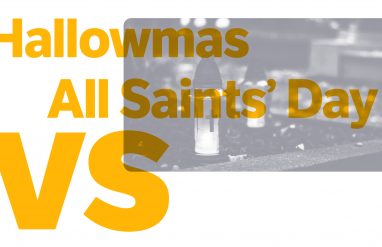Christmas is a Christian holiday to celebrate the birth of Jesus, the central figure of Christianity. Most Christians celebrate the holiday on December 25. (Fun fact: it is actually celebrated on January 7 in the Orthodox Church due to the use of a different calendar.)
Everyone knows this holiday as Christmas, right? But did you know there’s also another name for it?
First, what does Christmas mean?
Most often, the word Christmas refers to Christmas Day—the day on which the holiday is observed, most commonly December 25. The day or evening before Christmas is called Christmas Eve.
Christmas is also often used to refer to the entire Christmas season. Another word for the Christmas season is Christmastime. Generally, the season begins around the beginning of December, though some people in the US begin to decorate or engage in Christmas festivities immediately after the Thanksgiving holiday or even before (we see you putting up your lights to work off that Thanksgiving meal).
The Christmas season coincides with the holiday season, which in the US is popularly understood to include Thanksgiving, Hanukkah, Christmas, Kwanzaa, New Year’s Eve, and New Year’s Day. Due to its widespread observance, Christmas is a federal holiday in the US.
Christmas is also widely observed in secular (nonreligious) ways. Many nonreligious people still decorate a Christmas tree and exchange gifts on the holiday.
In religious terms, the Christmas season is sometimes considered to extend from Christmas Eve to the feast of the Epiphany or Twelfth Day on January 6. This period is sometimes called Christmastide, though this word can also be used in a more general way to refer to the period from Christmas Eve to New Year’s Day.
By those who celebrate it, Christmas is often seen as a magical time that’s associated with a sense of hope and wonder and a feeling of festiveness. This is often what people are expressing when they describe something as Christmassy or say that they are in the Christmas spirit.Where did the word Christmas come from?
The first records of the word Christmas in English come from before 1050. It comes from the Old English Cristes mǣsse, meaning “Mass of Christ.”
The word Christ means “anointed one” or “messiah” and is the title given to Jesus (as in Jesus Christ) by Christians due to their belief that he is the messiah who brings salvation. The words Christianity and Christian are based on the word Christ.
The celebration of Christmas may date to around the year 200, but it did not become widespread as a holiday until much later, around the Middle Ages. Today, Christians often attend church on Christmas Eve or Christmas morning. Much of the religious observance of Christmas involves the story of Jesus’s birth in a stable in the town of Bethlehem. Some Christians set up Nativity scenes depicting the scene of Jesus’s birth, including figures of Mary, Joseph, and the baby Jesus in a manger. For many Christians, religious observation of Christmas is done alongside other secular aspects of the season, such as the exchange of gifts and Santa Claus.
This sometimes leads to criticism among Christians that Christmas has become too secularized and commercialized. The abbreviation Xmas, for example, is sometimes seen as inappropriate, perhaps due to its replacement of the name Christ or its widespread use in commercial contexts, such as in advertising.
Spice up your holiday know-how with the story behind the controversial abbreviation “Xmas” here.
What does –mas mean then?
In the Middle Ages, the word mass referred to a religious feast day in honor of a specific person. This is what’s referred to by the ending -mas, which is used in the names of Christian holidays. By far the most well-known holiday that uses this ending is Christmas, but there are others, including Candlemas and Michaelmas.
What does Noel mean?
Noel is another word for Christmas, surprise!
However, the word Noel is often used only in a religious context. It’s possible for people to wish each other a Happy Noel, but the word is perhaps most commonly seen written on things like Christmas cards and decorations.
The word can also be used to refer to a Christmas carol or song (in which case it is not capitalized), but is no longer commonly used this way. Fittingly, most people know the word from the popular Christmas carol “The First Noel.”
WATCH: Can You Guess What These Christmas Carol Words Mean?
Where did the word Noel come from?
The first records of the word Noel in English come from the early 1800s. It comes from French Nöel—the French way of saying “Merry Christmas” is Joyeux Noël.
The word derives from Latin word nātālis (diēs), meaning “birthday.” Another name for Christmas is Nativity. Both Nativity and Noel reference the birth of Jesus and ultimately come from the Latin verb nāscī, meaning “to be born.” The English word natal (meaning “relating to a person’s birth”) is also based on this root.
Are there any other words for Christmas?
The word yule is sometimes used as another word for Christmas or Christmastime, but it is rooted in and is also used as a name for the celebration of the Winter Solstice that’s observed in some Pagan traditions. Some of these customs influenced the ways that Christmas is celebrated.
While you burn that yule log, read up about it and other facts about yule and Christmastime.














